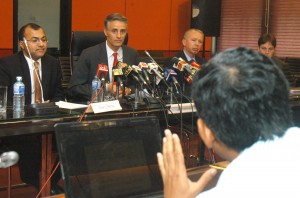IMF says no to budget support due to timing issue
View(s):By Duruthu Edirimuni Chandrasekera
Inconclusive negotiations over a specified time period to implement a set of reforms were amongst the multiple reasons that talks between the government and the International Monetary Fund (IMF) failed.
This was revealed by an IMF delegation here this week to discuss possible financial support for Sri Lanka’s economic reform agenda under an Extended Fund Facility (EFF).
John Nelms, Team Leader IMF staff mission told reporters on Wednesday said that discussions for an EFF fell apart for multiple reasons, one of them being the wait to implement certain reforms. “It was more a timing issue. The authorities agreed on the broad thrust of reforms, and noted that they already had plans which they would undertake at the appropriate time,” he said. He said that the government needs to adjust its energy pricing to a cost reflecting formula and place unprofitable state entities such as Ceylon Electricity Board and Ceylon Petroleum Corporation on a more sustainable footing. “The energy prices should be on an incremental basis. This is a more stable pricing policy.”
The Central Bank (CB) said Tuesday that the IMF had said it will not provide budget support to Sri Lanka and that CB didn’t need balance of payments support. Sri Lanka’s economic growth has been robust, inflation has declined from high double digits, fiscal and external consolidation is underway, according to the IMF, which said the country’s real GDP is projected at 6.25 percent this year.

A reporter asks a question at an IMF briefing in Colombo. Pic by Nilan Maligaspe
Mr. Nelmes pointed out that the economy continues to adjust to the bold policy measures undertaken by the authorities early last year to address emerging imbalances. Credit growth and domestic demand have slowed to a more sustainable pace, the trade deficit has narrowed, and a small balance of payments surplus was achieved last year.
At the same time, external demand was undermined by continued weakness in the global economy, and agriculture production was hampered by drought that prevailed for much of 2012, he said.
“The country is suffering from the highest inflation generated by the central bank in over four years. Our view is that inflation levels of around 10 per cent where we see them now is cause for holding interest rates cuts,” Mr. Nelmes said.
He added that monetary policy should remain on hold for coming months till there is a recovery in inflation.” “Right now there are two competing factors,” Mr. Nelmes said, noting that one is that growth is slowing. The other is inflation is high. In cases like this the balancing act for monetary policy is a challenging one, he said, stressing that the underlying inflation has been on the rise.
Mr. Nelms also said that most exports in the country are to the US and EU and noted that they need to be directed to Asia, where there’s more growth.
The government needed to take measures to broaden and strengtehn its tax revenue base which has now fallen below 11.5 per cent of GDP to support further fiscal consolidation, he added.
“Tax revenues have, among the lowest in the region, reflecting slowing activity, falling imports, exemptions, and issues with tax administration,” Mr. Nelms said.
Follow @timesonlinelk
comments powered by Disqus



















